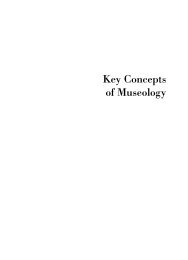ISS 25 (1995).pdf - The International Council of Museums
ISS 25 (1995).pdf - The International Council of Museums
ISS 25 (1995).pdf - The International Council of Museums
Create successful ePaper yourself
Turn your PDF publications into a flip-book with our unique Google optimized e-Paper software.
have many <strong>of</strong> the great museums adopted this same attitude in relation to<br />
the cultures represented in their collections? How frequently have they<br />
ignored the subtle differences between groups whose cultural heritage<br />
they have been collecting, and showing or representing in a simplistic<br />
way? How many times have they accepted artificial political boundaries,<br />
and considered different cultures within a simplistic all-embracing view?<br />
How far have they crashed national prides in the way they show other<br />
people's cultures, and have fostered feelings <strong>of</strong> superiority in the minds <strong>of</strong><br />
their dominant public?<br />
<strong>The</strong> awareness <strong>of</strong> this responsibility is now spreading throughout<br />
museum's pr<strong>of</strong>essional world, and changing attitudes and behaviours. In<br />
the ICOFOM annual meeting <strong>of</strong> 1988, in India, we have dealt with the<br />
theme <strong>of</strong> museology in developing countries, on help or manipulation. It<br />
is time now to discuss the question <strong>of</strong> museology in "developed"<br />
countries: how far it has helped to develop the present crisis, and for how<br />
long the great museums, and even not so great ones, have been fostering<br />
the national pride <strong>of</strong> the dominant nations, through the exposure <strong>of</strong> their<br />
wealth and richness, built upon the control and manipulation <strong>of</strong> other<br />
cultures? I am not entitled to discuss this point here and now, even if I<br />
have written a whole thesis on the "semiotics <strong>of</strong> the Museum language",<br />
exploring the power and the responsibility <strong>of</strong> our institutions in building<br />
up "models <strong>of</strong> the world". This discussion would lead us further into the<br />
problem <strong>of</strong> representation, and <strong>of</strong> the presentation <strong>of</strong> cultures on the<br />
Museum stage.<br />
<strong>The</strong> main point proposed for discussion here is the relationship between<br />
<strong>Museums</strong> and the Communities which they serve. I haven't touched this<br />
matter yet, or better, I think I have done it, when I've stressed what I<br />
consider to be the heart <strong>of</strong> the matter: the problem <strong>of</strong> Power, and <strong>of</strong><br />
Power balance in today's world. Power does not mean only the control<br />
<strong>of</strong> national boundaries and territories. In the sense <strong>of</strong> the Museum x<br />
Communities relationship, power means who takes the control <strong>of</strong> mental<br />
territories, <strong>of</strong> knowledge territories, <strong>of</strong> cultural boundaries, <strong>of</strong> defining<br />
what is valuable and important in the cultural field, <strong>of</strong> what is worth<br />
showing or not. Who takes the control <strong>of</strong> "history" and <strong>of</strong> the "discourse<br />
on history", whose voice is predominant in Museum speeches and in the<br />
relationship itself?<br />
I will thus approach this question as it can be envisaged against the<br />
reality <strong>of</strong> my own country : Brazil. A country as wide as a whole<br />
continent, with as many cultural variants as one could find in another<br />
45
















